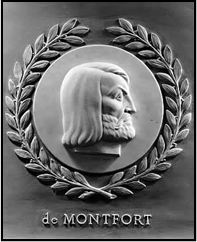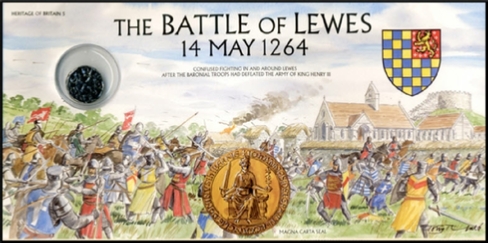


SIMON DE MONTFORT c1208 -
Including:
The Battle of
Lewes, 1264

xxxxxThe Norman Simon de Montfort arrived in England in 1230. He was soon a prominent member of court and became even more so when he married King Henry's sister, Eleanor in 1238. For many years he remained totally loyal to his brother-
 xxxxxSimon de Montfort, as his name suggests, was a Frenchman from Normandy, the son of the Simon de Montfort who had been one of the leaders of the bloody Albigensian Crusade in 1209. He arrived in England in 1230 and was soon a prominent member of the royal court, having been granted the earldom of Leicester -
xxxxxSimon de Montfort, as his name suggests, was a Frenchman from Normandy, the son of the Simon de Montfort who had been one of the leaders of the bloody Albigensian Crusade in 1209. He arrived in England in 1230 and was soon a prominent member of the royal court, having been granted the earldom of Leicester -
xxxxxIn the 1240s, however, Simon and Henry fell out, probably over money matters, and, for a time, Montfort retired to his estates in France. On his return they made up their differences, but the relationship was never the same again. The final break came a few years later when the King, having appointed Montfort as governor of the English province of Gascony (part of the Duchy of Guyenne), questioned his methods and began an inquiry into his rule. Once more, Montfort retired to France but, this time, there was to be no reconciliation.
 xxxxxBy the mid 1250s the king's continued incompetence as a ruler, and the growing burden of taxation on all classes, made a revolt inevitable. In 1258 Montfort threw in his lot with the barons and they made Henry agree to the Provisions of Oxford, which included a list of do’s and don’ts and the setting up of a committee of barons to make sure he didn’t do the don’ts. In 1261 Henry revoked the Constitutions and, once again, a disenchanted Montfort retired to France; but not for long. In a short time he was invited back by the barons to lead them in the fight against the king. In 1264, under his leadership, the barons won a resounding victory against their monarch at the Battle of Lewes on the Sussex coast. Both the king and his son Edward were captured and imprisoned. The way was now open for reform by an “uncrowned king of England”. As we shall see (1265), it was to be reform at a price.
xxxxxBy the mid 1250s the king's continued incompetence as a ruler, and the growing burden of taxation on all classes, made a revolt inevitable. In 1258 Montfort threw in his lot with the barons and they made Henry agree to the Provisions of Oxford, which included a list of do’s and don’ts and the setting up of a committee of barons to make sure he didn’t do the don’ts. In 1261 Henry revoked the Constitutions and, once again, a disenchanted Montfort retired to France; but not for long. In a short time he was invited back by the barons to lead them in the fight against the king. In 1264, under his leadership, the barons won a resounding victory against their monarch at the Battle of Lewes on the Sussex coast. Both the king and his son Edward were captured and imprisoned. The way was now open for reform by an “uncrowned king of England”. As we shall see (1265), it was to be reform at a price.
H3-
Acknowledgements
Simon de Montfort: marble relief by the American sculptor Gaetano Cecere (1894-


